ZoomInfo Alternatives
Looking for a ZoomInfo alternative? We compare 10 leading platforms on features, pricing, and data quality to help you decide.

ZoomInfo is a popular tool for good reason. Many teams use it to find emails, phone numbers, and B2B data. It performs well for sales intelligence and supports account-based selling. For these specific jobs, it is a solid choice.
However, some users report occasional data inaccuracies or find the pricing complex. For this reason, we analyzed the best alternatives based on G2 reviews. We compared their strengths and weaknesses against ZoomInfo to help your review. Let's get started.
Explore 11x Digital Workers
If your goal is to automate sales tasks, consider adding a digital worker to your team. These AI agents can handle prospecting and outreach, allowing your sales representatives to focus on closing deals. 11x provides this type of service for sales teams.
11x is a GTM platform with AI agents that manage the sales process. An agent named Alice finds prospects, handles outreach via email and LinkedIn, and maintains your CRM.
Another agent, Julian, qualifies inbound leads and schedules meetings. This approach consolidates tools for data enrichment, outreach, and email warmup into a single platform.
ZoomInfo Alternatives
The following section provides a detailed review of each ZoomInfo alternative. We analyze their pricing, features, and the main advantages and drawbacks when compared to ZoomInfo.
1) LinkedIn Sales Navigator
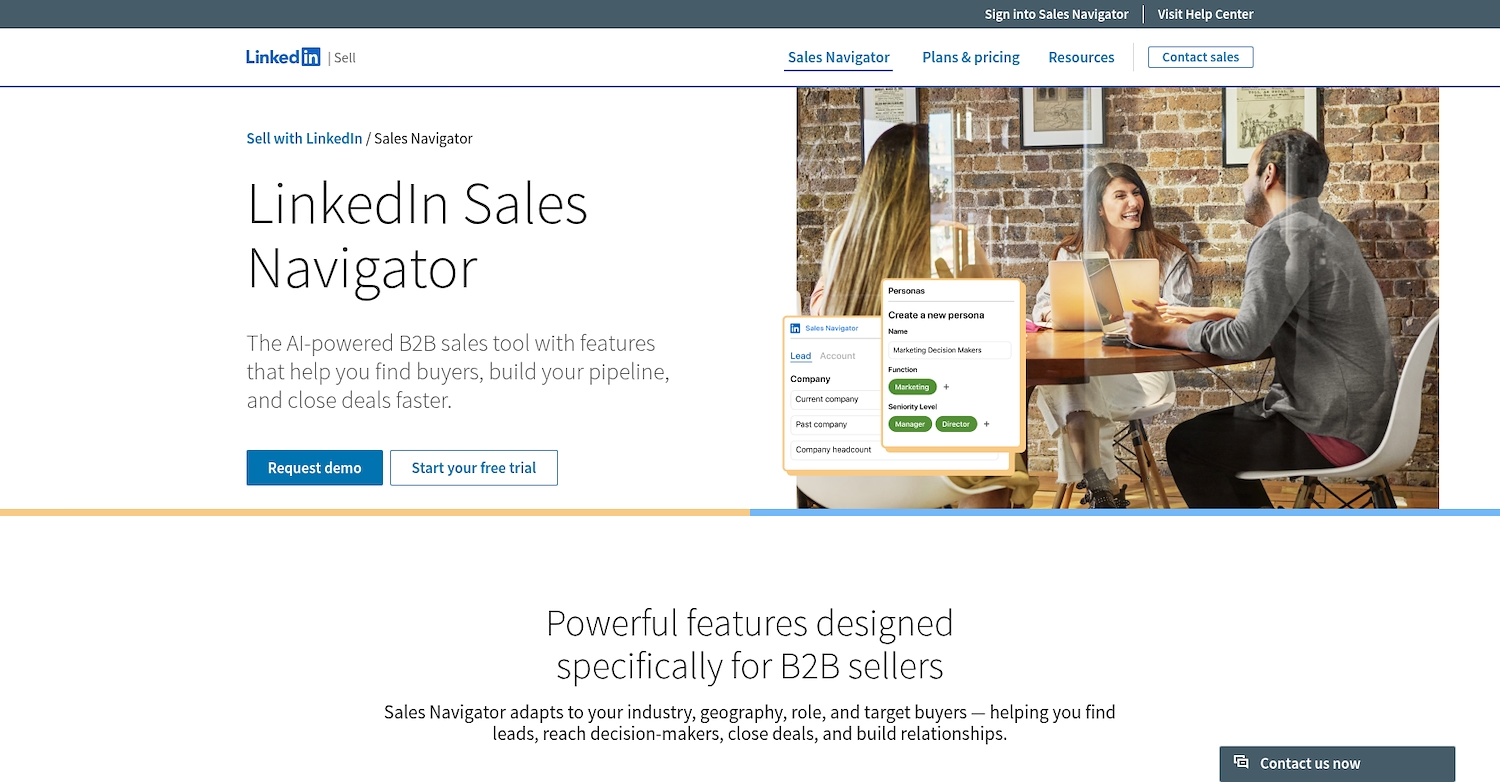
LinkedIn Sales Navigator uses the extensive LinkedIn network to help sales professionals. It allows for advanced searches to find specific leads and accounts. The platform provides sales insights and real-time updates on saved leads and companies.
This information supports account-based sales strategies. The tool helps identify key decision-makers within target organizations. Direct contact details like phone numbers or emails are not a primary feature.
LinkedIn Sales Navigator's Main Features
- Allows advanced lead and account searches using LinkedIn's network data.
- Provides sales insights and real-time updates for saved leads and accounts.
- Identifies key decision-makers within a target company's hierarchy.
LinkedIn Sales Navigator vs. ZoomInfo
Average Review score: 4.3/5 stars based on 1,990 G2 reviews.
- LinkedIn Sales Navigator taps into LinkedIn's live network of over 860 million members. This provides more current data on job changes and roles compared to ZoomInfo's database, which relies on periodic updates.
- It delivers real-time updates on saved leads and accounts directly within the LinkedIn ecosystem. This allows for more timely and context-aware outreach than the alerts that ZoomInfo provides.
- The platform helps map company hierarchies and identify key decision-makers. This focus on internal relationships offers a different approach to prospecting than ZoomInfo's emphasis on direct contact data.
- Its advanced search uses LinkedIn's unique data, such as shared connections and group memberships. This allows for more nuanced targeting compared to the standard filters available in ZoomInfo.
How It Compares to ZoomInfo
- The tool does not offer direct contact details like verified email addresses or phone numbers. This is different from ZoomInfo, which focuses on providing this specific data for direct sales outreach.
- It relies solely on the LinkedIn network for its data. Compared to ZoomInfo, which gathers information from many sources, this might sometimes result in a less complete contact profile.
- Some users report that its CRM integration can be less smooth for data enrichment. ZoomInfo, in comparison, often provides more direct functionality for automatically updating CRM records.
Pricing and Cost-Effectiveness
LinkedIn Sales Navigator's pricing is not publicly listed but is perceived as expensive by users, which is similar to ZoomInfo's complex, quote-based model. For the most accurate and up-to-date pricing information, we recommend visiting the official website.
2) Lusha
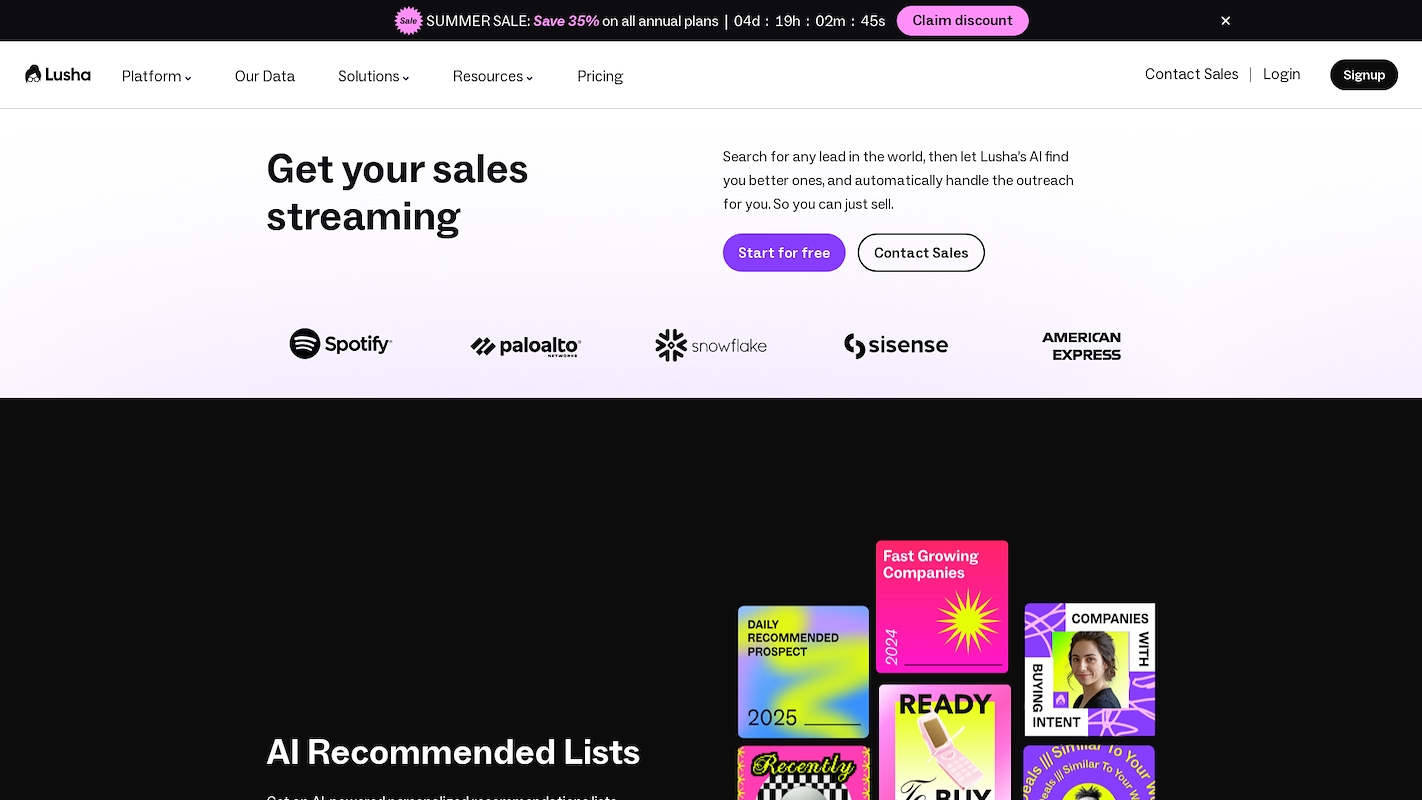
Lusha is a sales intelligence platform that provides global B2B contact data. Revenue teams use it to find leads, receive AI-based prospect recommendations, and automate multichannel outreach in one workflow. The platform emphasizes its global data coverage and compliance with regulations like GDPR and CCPA.
It integrates with CRMs and sales tools. This lets sales reps focus on sales tasks while the system handles data discovery.
Lusha's Main Features
- Provides AI-recommended lists of companies and decision-makers based on your ideal customer profile.
- Creates live, auto-updating prospect playlists that continuously add fresh leads at user-defined intervals.
- Automates and personalizes email sequences with AI-driven copy to manage outreach.
- Records and analyzes sales meetings to extract insights from conversations.
Lusha vs. ZoomInfo: Strengths Compared
Average Review score: 4.3/5 stars based on 1,516 G2 reviews.
- Lusha provides AI Prospect Playlists that automatically generate and refresh lead lists based on an ideal customer profile. This is a different approach compared to ZoomInfo, where users generally build static lists that need manual updates.
- Its pricing structure includes a free plan and transparent monthly tiers for individual users. This model is more accessible for small teams or individuals compared to ZoomInfo's custom, quote-based pricing.
- The platform includes features to automate email sequences with AI-generated copy suggestions. This focus on AI content assistance differs from ZoomInfo's sales automation, which centers more on workflow and task execution.
- Many users report that the user interface and Chrome extension are very simple to use for contact discovery. This ease of use can be an advantage over the more feature-dense and complex interface of ZoomInfo.
How It Compares to ZoomInfo
- Lusha's data accuracy can sometimes be less consistent than ZoomInfo's. Some users report outdated contacts, whereas ZoomInfo collects information from many sources, which can result in a more complete contact profile.
- The tool's CRM integration is sometimes less seamless. Users note that the two-way data sync can have gaps, unlike ZoomInfo, which often provides more direct functionality for automatic CRM record updates.
- It uses a credit-based system to unlock contact details. This model might be restrictive for high-volume sales teams, compared to ZoomInfo's plans that typically allow for more extensive data access.
Pricing and Cost-Effectiveness
Lusha's transparent price structure includes a free plan and paid tiers like Pro ($36/month) and Premium ($59/month). This approach is more accessible for smaller teams than ZoomInfo's custom, quote-based model. For detailed plan information, visit Lusha's official website.
3) Apollo.io
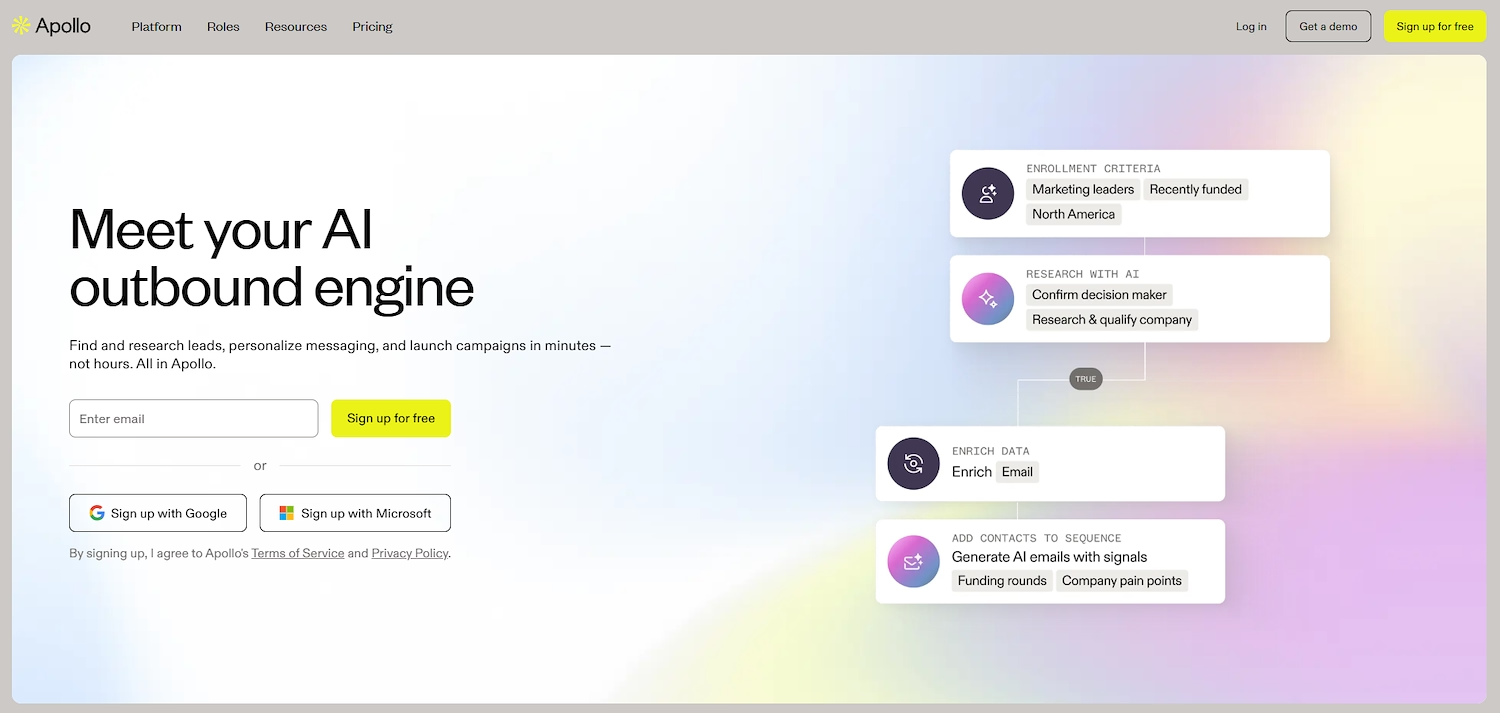
Apollo.io is a sales intelligence platform that offers a B2B database with verified emails and phone numbers. Sales teams use the platform for prospect discovery and to execute account-based sales strategies.
The system also provides sales intelligence and identifies buyer intent signals, which help teams determine when to contact potential customers.
Apollo.io's Main Features
- Provides a B2B database with verified emails and phone numbers.
- Identifies buyer intent signals, which help teams determine when to contact potential customers.
- Includes sales intelligence to support prospect discovery.
Apollo.io vs. ZoomInfo: Strengths Compared
Average Review score: 4.7/5 stars based on 8,904 G2 reviews.
- Apollo.io integrates data discovery with a native sales engagement suite for sequencing. This provides an all-in-one workflow, whereas ZoomInfo's primary focus remains on data provision.
- It offers transparent, tiered pricing, including a free plan for individuals. This approach differs from ZoomInfo's opaque, enterprise-focused custom quotes.
- The tool's plans often include more generous credit allowances for data exports. This can offer a cost advantage over ZoomInfo, where credits for direct contact reveals can be more limited.
- Its user interface is frequently noted for ease of use in both prospecting and outreach. This presents a simpler user experience when compared to the feature-rich, and sometimes complex, interface of ZoomInfo.
How It Compares to ZoomInfo
- Some users report that Apollo.io's data accuracy can be inconsistent, especially for mobile numbers. ZoomInfo, in comparison, invests heavily in a multi-step verification process which may result in more reliable direct-dial information.
- The tool lacks some of the advanced enterprise-level features that ZoomInfo offers, like sophisticated territory management or detailed organizational charts. This makes it a different choice for large sales teams that need complex hierarchy mapping.
- Its database might have less depth in certain niche industries when compared to ZoomInfo. For highly specialized sectors, ZoomInfo sometimes provides more granular company and contact data.
Pricing and Cost-Effectiveness
Apollo.io offers transparent pricing with a free plan and paid tiers starting at $49 per user per month. This contrasts with ZoomInfo's custom, quote-based model, making Apollo.io more accessible for smaller teams. For the most accurate pricing, visit Apollo.io 's official website.
4) Cognism
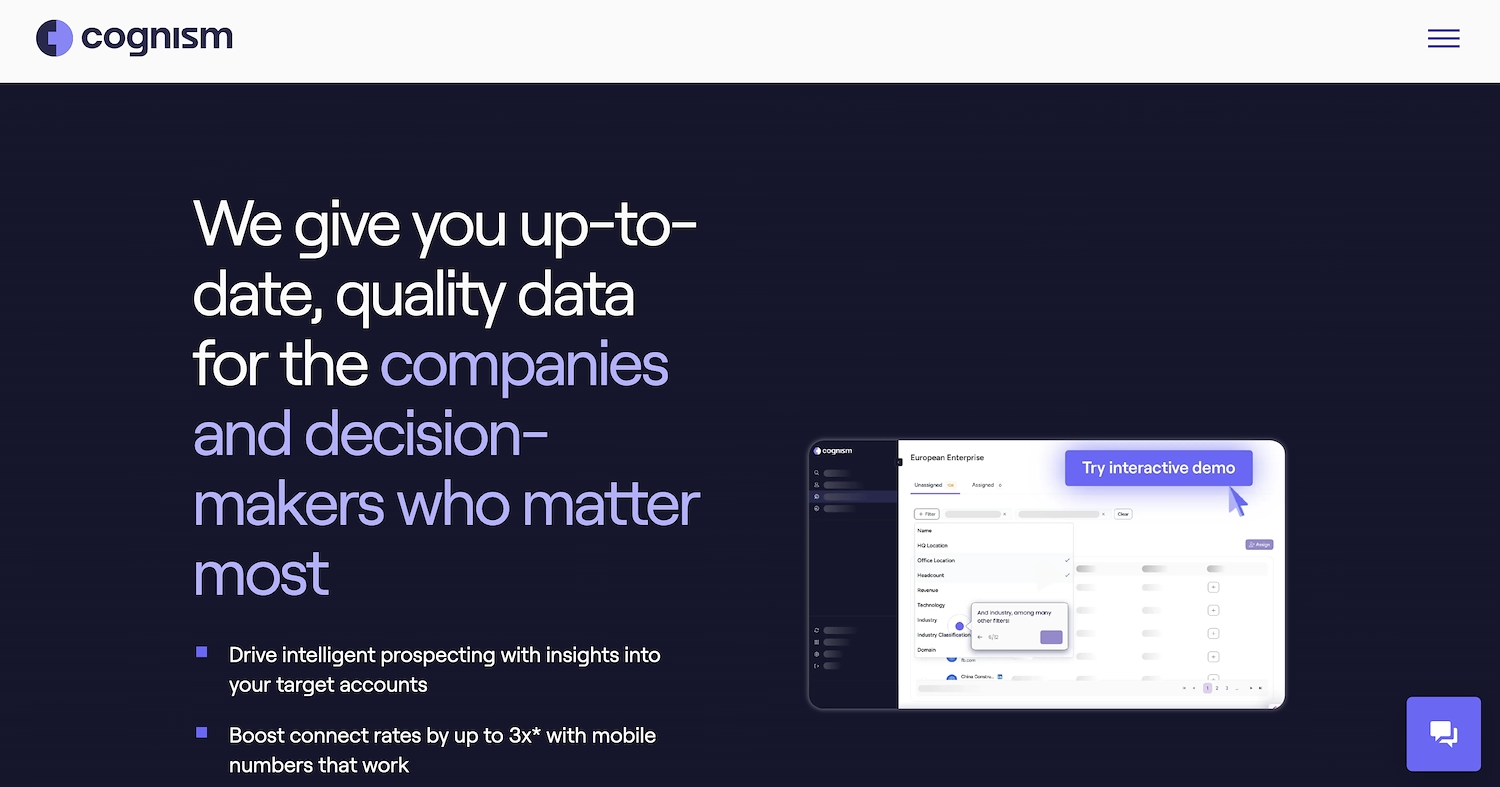
Cognism is a sales intelligence platform that offers B2B contact data. It supplies verified emails and phone numbers to help sales and marketing teams connect with customers. The system supports account-based sales and helps generate leads through its global database, which is compliant with GDPR and CCPA.
It also provides intent data to show which accounts research your solutions. This information helps teams build target lists and enrich CRM data with accurate contact details.
Cognism's Main Features
- Provides phone-verified, human-checked mobile numbers, called Diamond Data®, to increase connection rates.
- Offers extensive coverage of mobile numbers and email addresses for contacts in the UK and EMEA regions.
- Identifies buying signals like hiring trends, funding rounds, and technology changes for timely outreach.
- Includes a browser extension that provides contact suggestions, signal data, and quick company summaries.
Cognism vs. ZoomInfo: Strengths Compared
Average Review score: 4.6/5 stars based on 1,033 G2 reviews.
- Cognism uses a human-verification process for its Diamond Data® mobile numbers. This approach to data accuracy differs from ZoomInfo's reliance on automated collection and verification.
- The platform is often praised for its intuitive user interface. This can offer a simpler experience for sales prospecting compared to the more feature-dense layout of ZoomInfo.
- This tool provides extensive data coverage for contacts in the UK and EMEA. The regional specialization can result in more reliable contact information in these areas compared to ZoomInfo's broader, US-focused database.
- It emphasizes GDPR and CCPA compliance in its data collection. This provides an extra layer of security for teams that work with European markets, a focus less pronounced with ZoomInfo.
How It Compares to ZoomInfo
- Cognism's database sometimes has less depth in niche industries. In contrast, ZoomInfo often provides more granular company and contact data for highly specialized sectors.
- The tool does not offer some of the advanced enterprise features found in ZoomInfo, such as sophisticated territory planning or detailed organizational charts for large sales teams.
- While its Diamond Data® is human-verified, some users find that the broader database can have inconsistencies. ZoomInfo's automated, multi-source approach sometimes provides more comprehensive contact profiles.
Pricing and Cost-Effectiveness
Cognism’s pricing is quote-based and tailored to individual needs, similar to ZoomInfo's model. Both are considered premium options, so getting a direct quote is necessary for an accurate comparison. For more details, visit Cognism's official website.
5) UpLead
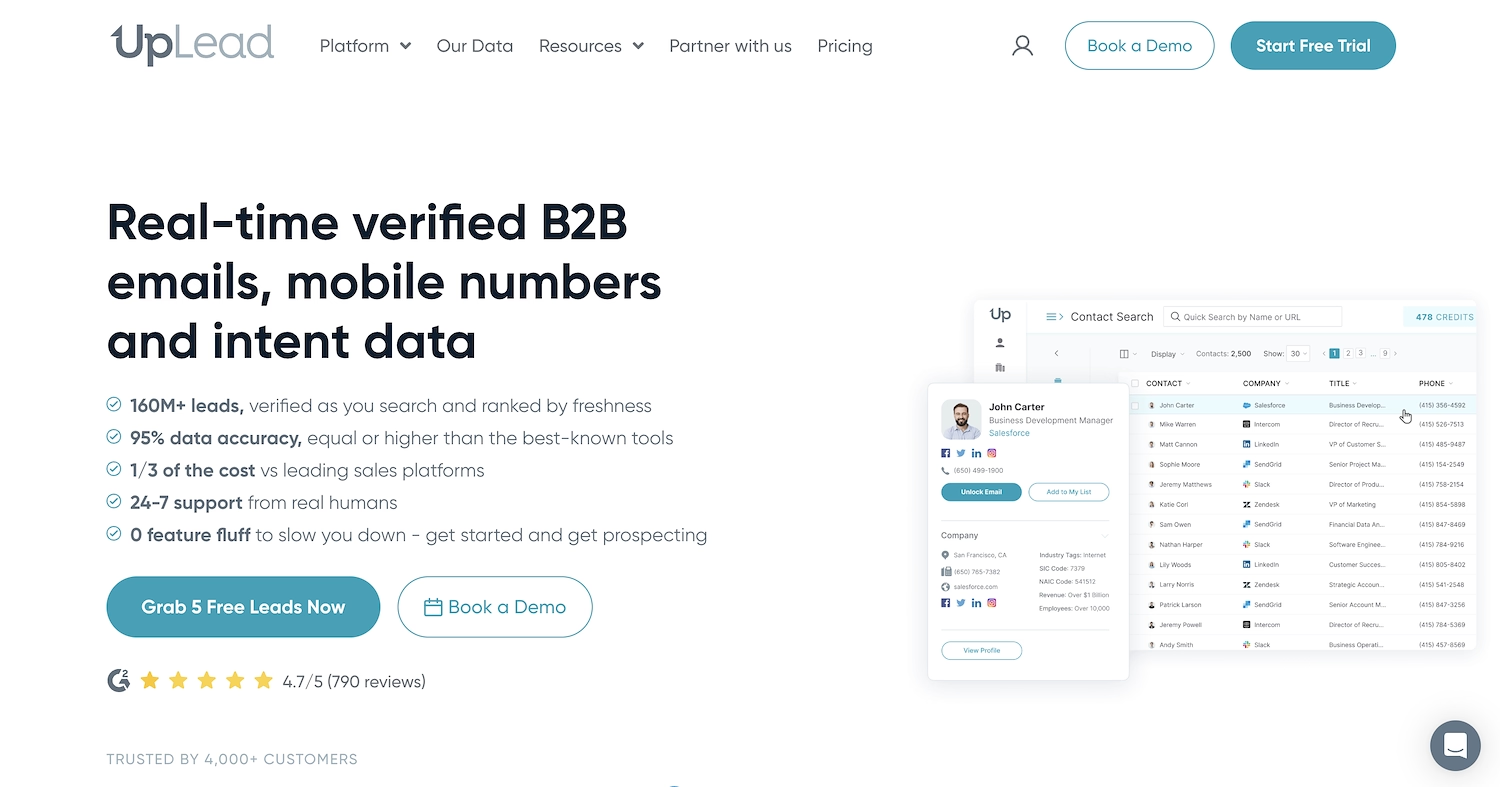
UpLead is a B2B database that provides contact and company data. Sales teams use the platform to find verified emails and phone numbers, support account-based sales, and receive sales intelligence. The system includes trigger events to signal buyer intent and has a real-time verification process to ensure data accuracy.
UpLead's Main Features
- The system performs real-time email verification for all data exports and includes a 95% accuracy guarantee.
- It offers technographics data that tracks more than 16,000 specific technologies used by a company.
- The platform provides automatic credit refunds for any contact data that bounces or is inaccurate.
- A bulk lookup feature enriches thousands of leads at once with over 40 different data points.
UpLead vs. ZoomInfo: Strengths Compared
Average Review score: 4.7/5 stars based on 797 G2 reviews.
- UpLead provides a 95% data accuracy guarantee and offers credit refunds for any bounced data. This is a different approach compared to ZoomInfo, which does not have a similar public refund policy.
- It performs real-time email verification at the moment of export. This process differs from ZoomInfo's reliance on periodic database updates.
- The platform offers transparent pricing tiers, including a free trial. This makes it more accessible for smaller teams compared to ZoomInfo's custom, quote-based model.
- Its technographics data tracks over 16,000 technologies. This specific focus can provide more granular insights than the broader technology tracking available in ZoomInfo.
How UpLead Compares To ZoomInfo
- UpLead's database sometimes has less coverage in niche industries. In comparison, ZoomInfo often provides more detailed company and contact data for very specific sectors.
- The tool does not include some of the advanced features for large enterprises that ZoomInfo provides, such as complex territory planning or detailed organizational charts.
- Its dataset, while accurate, can sometimes be less comprehensive. ZoomInfo collects data from a wider variety of sources, which may result in more complete contact profiles with additional data points.
Pricing and Cost-Effectiveness
UpLead offers transparent pricing with a free trial and paid plans starting at $99 per month. This model contrasts with ZoomInfo's custom, quote-based approach, making UpLead more accessible for teams that need predictable costs. For detailed plan information, visit UpLead's official website.
Consider a Digital Worker for Your Sales Team
If you want to automate sales tasks like prospecting and outreach, consider a digital worker. This approach lets your sales team focus on closing deals instead of lead generation. 11x offers AI agents built for this purpose.
The platform's AI agents find prospects, handle outreach, and update your CRM. If this approach aligns with your sales goals, consider exploring what 11x has to offer.
At 11x, we use AI agents to run your sales playbook. Alice finds accounts, enriches data, and manages outreach, while Julian qualifies leads and schedules meetings. Our platform replaces tools for intent signals and email warmup, consolidating your GTM stack.
Book a demo to see the platform in action.
6) Clearbit
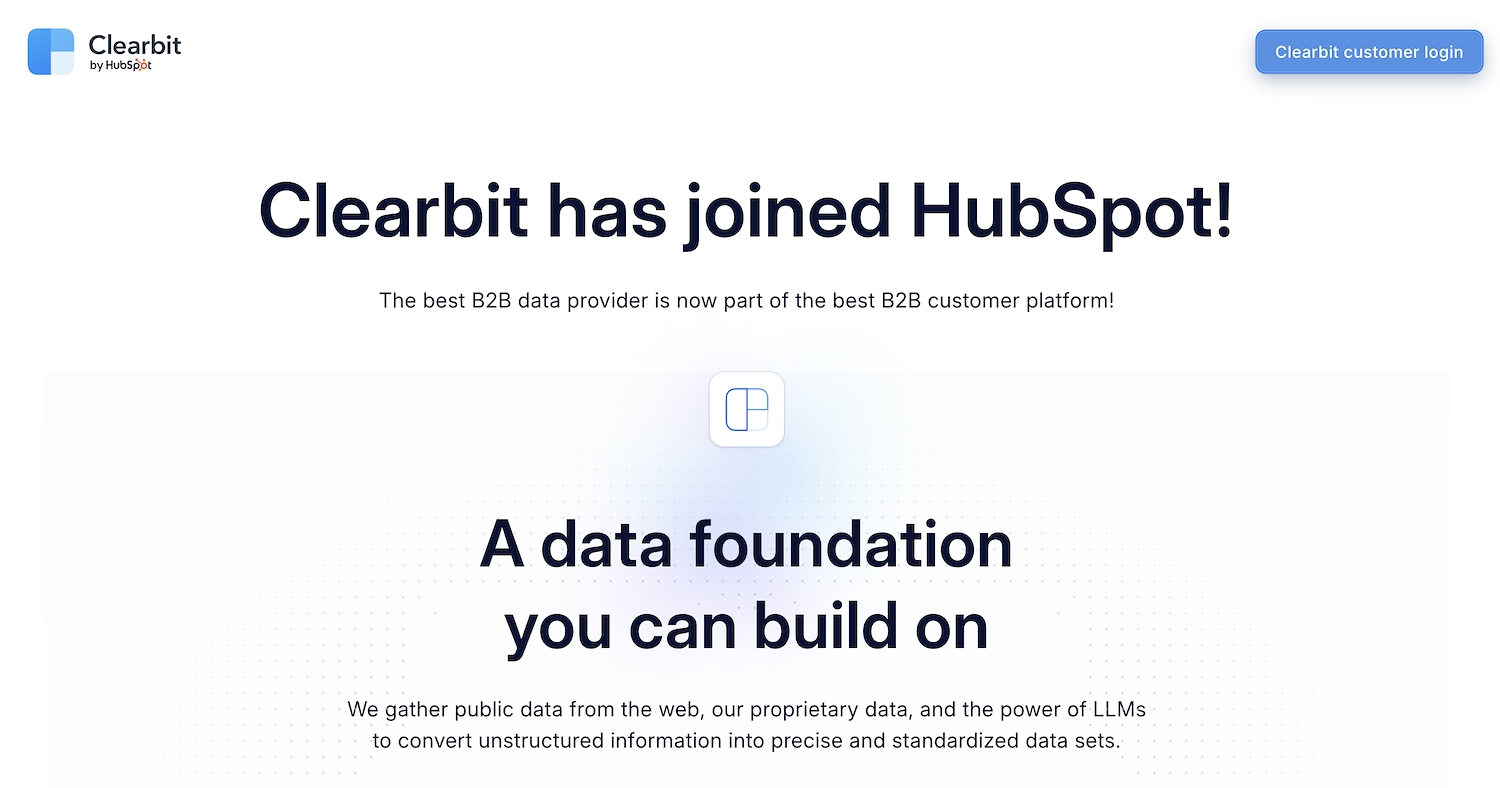
Clearbit provides a data platform for B2B companies. It enriches customer records to build complete profiles of accounts and contacts. The service offers a database with emails and phone numbers to support account-based sales strategies.
Teams also use the platform to find sales triggers and other intelligence. This data helps sales professionals understand when to engage with prospects.
Clearbit's Main Features
- Aggregates public web data and proprietary sources with LLM techniques to create standardized datasets.
- De-anonymizes website traffic to reveal visiting companies that match the ideal customer profile.
- Supplies data for real-time lead scoring with deep industry classifications like 6-digit NAICS, GICS, and SIC codes.
- Removes form fields it can enrich automatically, which helps increase conversion rates.
Clearbit vs. ZoomInfo: Strengths Compared
Average Review score: 4.4/5 stars based on 626 G2 reviews.
- Clearbit uses machine learning and a QA process on public web data to build its datasets. This approach differs from ZoomInfo's method, which often combines automated collection with a large contributory network.
- It de-anonymizes website traffic in real time to identify visiting companies. This provides immediate marketing intelligence, a different focus compared to ZoomInfo's broader sales intelligence platform.
- The platform shortens website forms by automatically enriching lead data. This feature aims to increase conversion rates, a specific marketing function that is less of a primary focus for ZoomInfo's sales-oriented toolset.
- Its data includes deep industry classifications, like 6-digit NAICS codes, for precise lead scoring. This level of detail offers a different kind of granularity compared to the standard industry filters in ZoomInfo.
How It Compares to ZoomInfo
- Some users report that Clearbit's contact database is less extensive than ZoomInfo's. This can sometimes result in fewer available contacts, especially in niche industries where ZoomInfo's larger dataset may have an advantage.
- The tool's focus is more on data enrichment than on direct-dial phone numbers. In comparison, ZoomInfo has a strong emphasis on verified mobile numbers, a key difference for sales outreach teams.
- It lacks some of the advanced sales features that ZoomInfo provides. For instance, it does not offer complex territory management tools or detailed organizational charts that large enterprise sales organizations often use.
Pricing and Cost-Effectiveness
Clearbit uses a custom, quote-based pricing model, which is similar to ZoomInfo's approach. Both are considered enterprise-level solutions, so a direct quote is needed for an accurate cost comparison. For the most up-to-date information, visit Clearbit's official website.
7) Seamless.ai
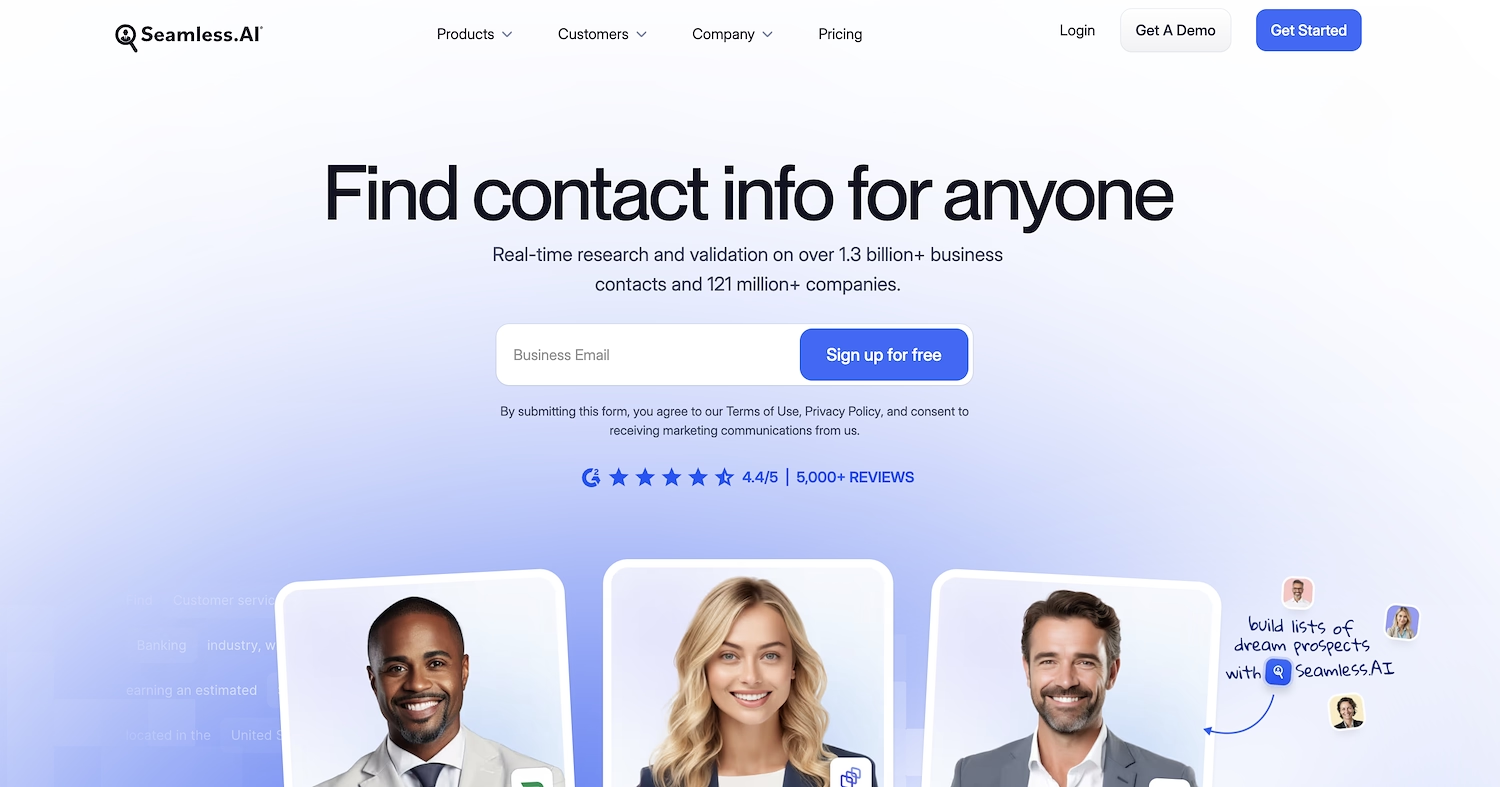
Seamless.ai is a sales intelligence platform with a B2B database. Sales teams use it to find verified emails and phone numbers. The system also provides sales intelligence and identifies sales triggers to support account-based sales. This helps teams connect with key decision-makers at the right time.
Seamless.ai's Main Features
- Generates research and personalized messaging for each prospect using AI.
- Automates list-building workflows to maintain pipeline generation hands-free.
- Detects and sends alerts on customer or prospect role changes and captures new contact information.
- Surfaces prospects who show intent signals indicating they are ready to buy.
Seamless.ai vs. ZoomInfo: Strengths Compared
Average Review score: 4.4/5 stars based on 5,067 G2 reviews.
- Seamless.ai uses a real-time search engine to find contact data. This approach differs from ZoomInfo, which relies on a database that receives periodic updates.
- It provides AI-generated personalized messaging for prospects. This is a different focus from ZoomInfo, which centers more on providing raw data and workflow tools.
- The tool sends automatic alerts when contacts change roles. This provides timely outreach opportunities, a feature that is less prominent in ZoomInfo's standard offering.
- Its platform automates list-building to keep the sales pipeline full. This hands-free approach is different from ZoomInfo, where users typically build and manage lists manually.
How It Compares To ZoomInfo
- Some users report that Seamless.ai's data can be less reliable. In comparison, ZoomInfo uses a multi-step verification process, which may result in more accurate contact information for outreach.
- The tool lacks some advanced features for large enterprises. For example, ZoomInfo offers complex territory management and detailed organizational charts, which are not a central part of the Seamless.ai platform.
- Its database sometimes has less depth in certain niche industries. ZoomInfo, by comparison, often provides more granular company and contact data for specialized sectors because it collects information from many sources.
Pricing and Cost-Effectiveness
Seamless.ai offers a free plan and paid tiers starting at $149 per month. This contrasts with ZoomInfo's custom, quote-based model, making Seamless.ai a more accessible option for teams that need predictable costs. For the most accurate pricing, visit Seamless.ai's official website.
8) LeadIQ
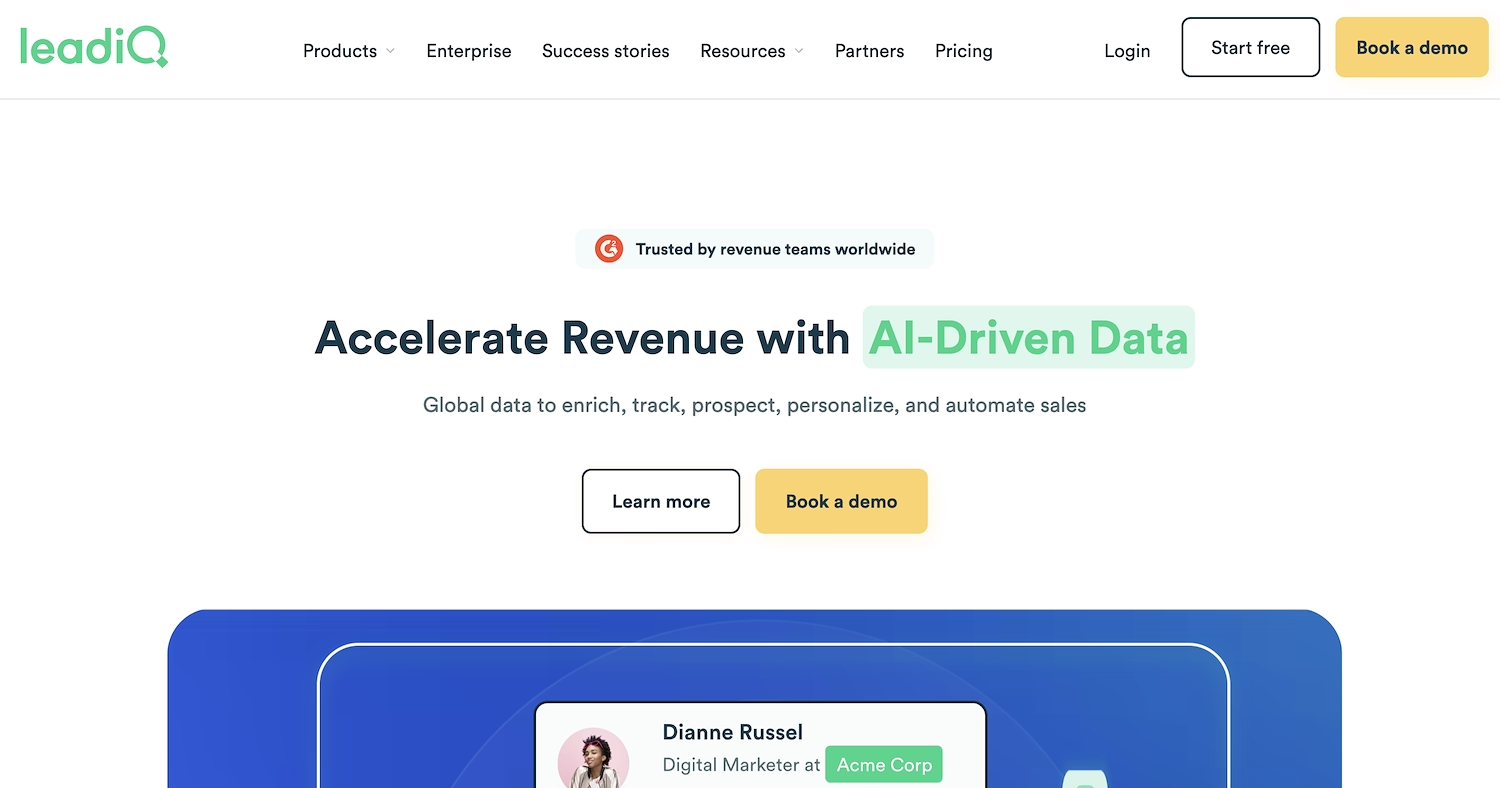
LeadIQ is a sales intelligence platform for sales teams. Professionals use it to find contact data, like phone numbers and emails, from its B2B database. The tool supports account-based sales with sales triggers and intelligence. This helps reps identify and connect with prospects at the right time.
LeadIQ's Main Features
- Builds prospect lists using its lead builder and search functions.
- Monitors leads and provides updates on key account changes.
- Integrates with CRM and marketing automation systems for data syncing.
- Provides access to contact, company, and industry-level research data.
LeadIQ vs. ZoomInfo: Strengths Compared
Average Review score: 4.2/5 stars based on 1,097 G2 reviews.
- LeadIQ offers transparent pricing, including a free plan for individuals. This model provides more cost predictability compared to ZoomInfo's custom, quote-based system.
- It includes a feature called Scribe to help users personalize outreach messages. This focus on message assistance is different from ZoomInfo, which primarily provides raw data and workflow tools.
- The platform provides direct integrations with sales tools like Outreach and Salesloft. This creates a smoother workflow for sales teams than the separate data export and import steps sometimes required with ZoomInfo.
- Its user interface and browser extension are often noted for their ease of use. This can offer a simpler user experience for daily prospecting tasks compared to the more complex, feature-dense layout of ZoomInfo.
How It Compares To ZoomInfo
- Some users report that LeadIQ's contact data, particularly phone numbers, can be inaccurate. This is different from ZoomInfo, which uses a multi-step verification process that may result in more reliable contact information.
- The tool's database might have less depth in certain niche industries. In comparison, ZoomInfo often provides more granular company and contact data for highly specialized sectors because it gathers information from many sources.
- LeadIQ does not offer some of the advanced features for large enterprises that are found in ZoomInfo. For example, it lacks complex territory planning tools or detailed organizational charts, which are often used by large sales teams.
Pricing and Cost-Effectiveness
LeadIQ offers transparent pricing with a free plan and paid tiers starting at $45 per month. This model provides more cost predictability than ZoomInfo's custom, quote-based system. For detailed plan information, visit LeadIQ's official website.
9) RocketReach
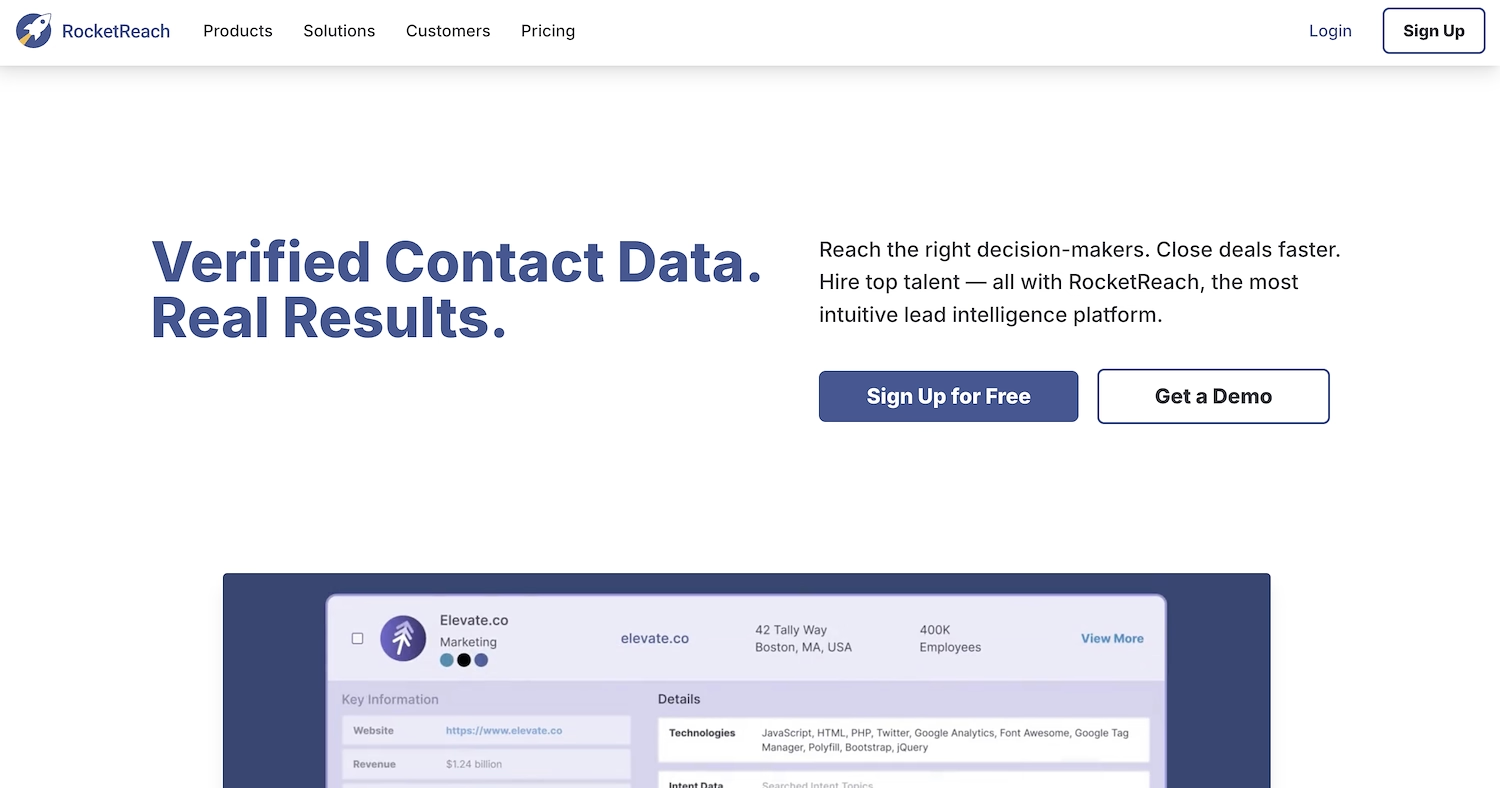
RocketReach is a sales intelligence platform with a B2B database. Sales teams use it to find emails and phone numbers. The tool also identifies sales triggers to support account-based sales strategies, which helps professionals connect with prospects at the right time.
RocketReach's Main Features
- Provides real-time access to a database of over 700 million professionals and 35 million companies.
- Offers advanced search capabilities, bulk lookups, an API, and browser extensions for Chrome and Edge.
- Includes an automated workflow feature, Autopilot, to discover and engage with prospects.
- Integrates with platforms like Salesforce, HubSpot, and Salesloft through prebuilt connections and Zapier.
RocketReach vs. ZoomInfo: Strengths Compared
Average Review score: 4.4/5 stars based on 918 G2 reviews.
- RocketReach offers transparent pricing, including a free plan for individual users. This model provides more cost predictability than ZoomInfo's custom, quote-based system.
- It provides access to a large database of over 700 million professionals. This scale can sometimes yield more contacts in specific global markets compared to ZoomInfo's database.
- The platform connects with thousands of apps through Zapier. This offers a different kind of flexibility for building custom workflows than ZoomInfo's set of prebuilt integrations.
- The tool includes specialized data for the healthcare sector. This focus may provide more accurate contacts in that industry than ZoomInfo's broader B2B data coverage.
How It Compares To ZoomInfo
- Some users find that RocketReach's contact data can be less reliable. In comparison, ZoomInfo invests in a multi-step verification process, which may result in more accurate direct-dial numbers for sales outreach.
- The platform does not have some of the advanced features for large enterprises that ZoomInfo offers. For instance, it lacks complex territory management tools or detailed organizational charts that large sales teams often use.
- Its database, while large, sometimes has less depth in certain niche industries. ZoomInfo, by contrast, often provides more granular company and contact data for highly specialized sectors because it gathers information from many sources.
Pricing and Cost-Effectiveness
RocketReach offers transparent pricing with a free plan and paid tiers starting at $99 per month. This model provides more cost predictability than ZoomInfo's custom, quote-based system, making it accessible for smaller teams. For detailed plan information, visit RocketReach's official website.
10) D&B Hoovers
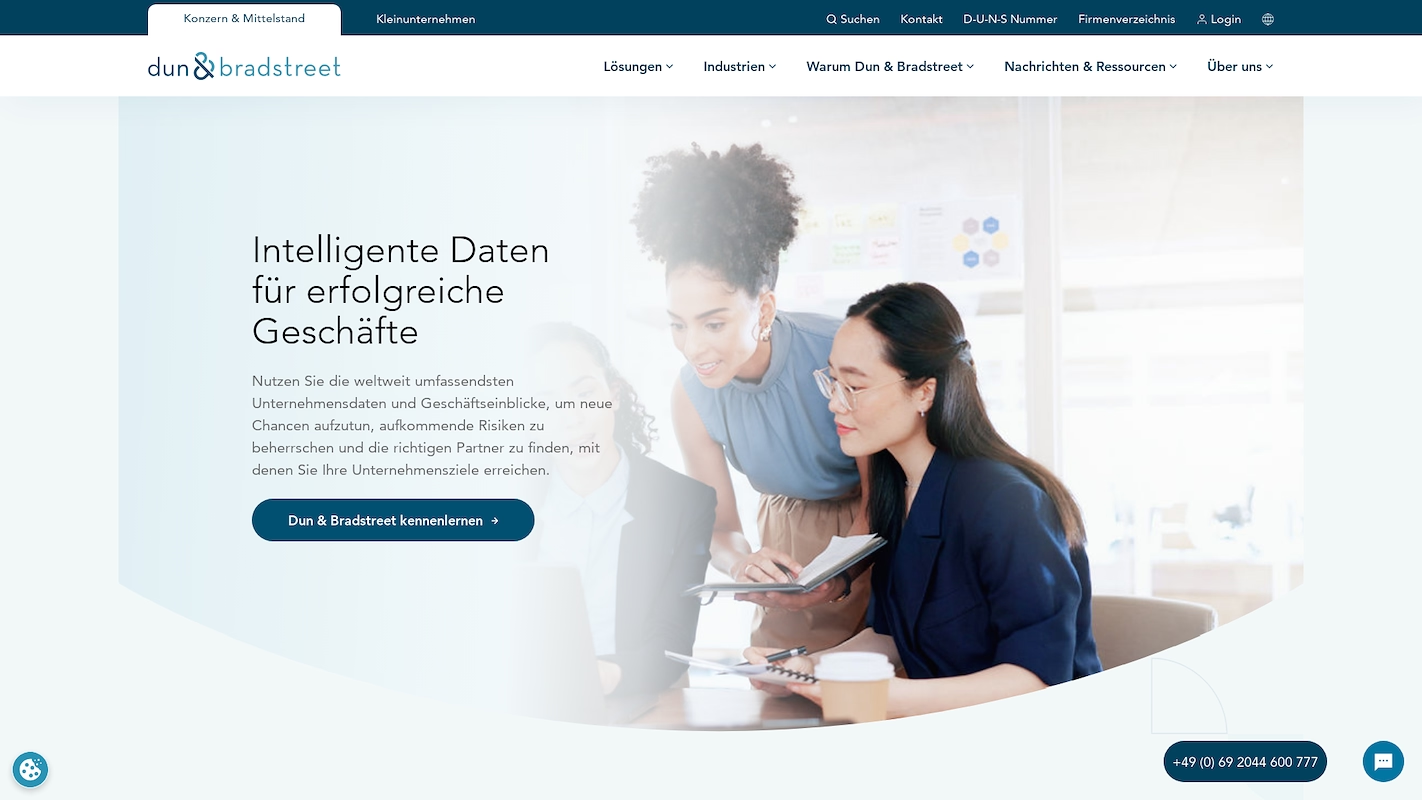
D&B Hoovers is a sales intelligence platform that uses Dun & Bradstreet's Data Cloud. It offers a B2B database with company profiles, contact details, emails, and phone numbers. Sales teams use the tool to find leads and execute account-based sales plans.
The system also provides sales triggers and business intelligence to help users connect with decision-makers. This information supports targeted outreach and helps build a sales pipeline.
D&B Hoovers's Main Features
- The platform uses the Dun & Bradstreet D-U-N-S® Numbering System to organize its database of over 272 million company profiles.
- It provides access to analyst research, competitive comparisons, and industry forecasts.
- The system integrates intent data from Bombora and its own Visitor Intelligence to identify active buyers.
- It maps over 37 million corporate linkages to reveal complex organizational structures.
D&B Hoovers vs. ZoomInfo: Strengths Compared
Average Review score: 4.1/5 stars based on 717 G2 reviews.
- D&B Hoovers organizes its data with the Dun & Bradstreet D-U-N-S® Number. This provides a globally recognized standard for company identification, which differs from the proprietary data structure used by ZoomInfo.
- It provides access to analyst research and industry forecasts. This offers deeper market context compared to ZoomInfo, which focuses more on contact-level data and sales triggers.
- The tool maps over 37 million corporate family trees. This detailed view of parent companies and subsidiaries can offer a more complete picture of an organization than the standard org charts in ZoomInfo.
- Its platform combines intent data from Bombora with its own Visitor Intelligence. This mix of sources offers a different perspective on buyer activity compared to the proprietary intent signals that ZoomInfo provides.
How It Compares To ZoomInfo
- Some users report that D&B Hoovers' contact data can be outdated. This differs from ZoomInfo, which uses a large contributory network and frequent updates to keep its database current.
- The platform can have a longer implementation time, sometimes taking up to a month. In comparison, teams using ZoomInfo can often start prospecting more quickly after the initial setup.
- Its direct-dial phone numbers are sometimes found to be less reliable. ZoomInfo, by contrast, places a strong emphasis on providing verified mobile numbers, which may result in higher connection rates.
Pricing and Cost-Effectiveness
D&B Hoovers uses a custom, quote-based pricing model, similar to ZoomInfo. Both are considered premium, enterprise-level solutions, so obtaining a direct quote is necessary for an accurate cost comparison. For more details, visit the D&B Hoovers's official website.
Which One Should You Go With?
Choosing the right ZoomInfo alternative depends on many factors, including your team's size, budget, and specific sales goals. This guide reviewed several options to help you make an informed decision.
If your goal is to automate sales tasks, consider 11x. The platform uses AI agents to handle prospecting and outreach. This approach allows your sales team to focus on closing deals instead of manual lead generation.




